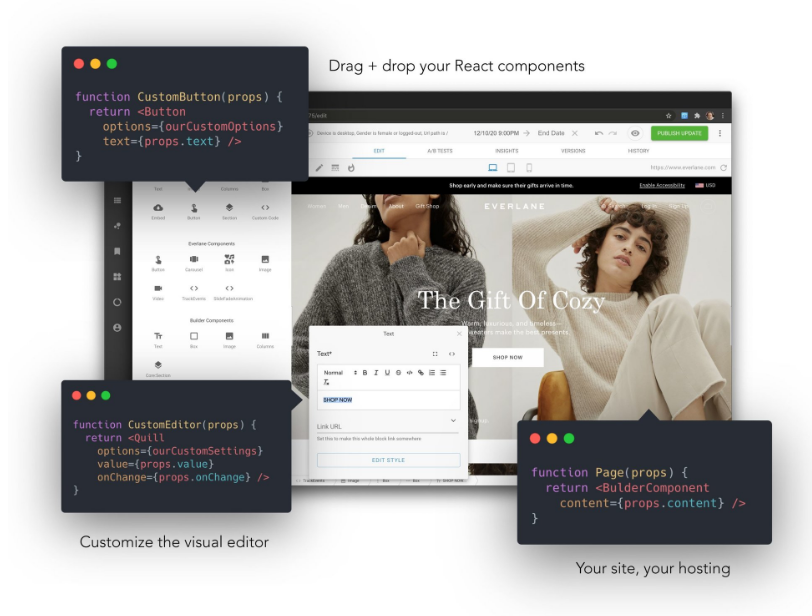Top 18 Open-Source HIPAA-Compliant Technologies and Projects for Hospitals and Healthcare Service Providers
Table of Content
As an avid healthcare blog with a deep focus on open-source technologies for healthcare and education, we excited to share some top-notch open-source HIPAA-compliant tools that are transforming the landscape of healthcare app development.
While this post will focus on the open-source techs, our next posts will focus on several cloud services with HIPAA-compliant options for enterprise.
Whether you're developing an electronic health record (EHR) system, a telehealth platform, or a comprehensive healthcare solution, these technologies can help ensure your application meets stringent HIPAA requirements.
1. OpenEMR
OpenEMR is a powerful, open-source electronic health record and medical practice management application. It's certified by ONC and supports a wide range of features essential for healthcare providers.
Key Features:
- Patient scheduling and demographics
- Electronic medical records and billing
- Prescriptions and lab integration
- Multi-language support
Why It's Great: OpenEMR’s comprehensive feature set and robust community support make it a reliable choice for healthcare providers aiming to stay HIPAA-compliant.
2- OpenMRS
OpenMRS (Open Medical Record System) is a platform for developing patient-centric health IT systems. It’s designed to be flexible and scalable, catering to various healthcare settings.
Key Features:
- Modular architecture for easy customization
- Comprehensive patient data management
- Extensible with numerous add-ons
- Strong global community and support
Why It's Great: OpenMRS’s flexibility and community-driven development ensure it remains up-to-date with the latest in healthcare IT needs.
3. Nextcloud
Nextcloud is a self-hosted versatile open-source cloud solution offering file synchronization and sharing, which can be configured to be HIPAA-compliant with appropriate settings and usage.
Key Features:
- Secure file storage and sharing
- Comprehensive user management
- Audit logs and access control
- End-to-end encryption
Why It's Great: Nextcloud’s robust security features and flexibility make it ideal for healthcare organizations needing to manage sensitive data securely.
4. Keycloak
Keycloak is an open-source identity and access management solution that supports single sign-on (SSO) and multi-factor authentication (MFA).

Key Features:
- SSO and federated identity
- User federation and social login
- Role-based access control
- Extensible with custom themes and providers
Why It's Great: Keycloak ensures secure authentication and authorization processes, critical for maintaining HIPAA compliance.
5. Redox
Redox offers a set of open-source tools and APIs for healthcare integration, ensuring secure data exchange between healthcare applications.
Key Features:
- Interoperability solutions
- Data normalization and transformation
- Secure data transmission
- Scalable infrastructure
Why It's Great: Redox simplifies the complexities of healthcare integration, ensuring that data exchange is secure and compliant.
6- CMS Solutions: Drupal
Drupal is an open-source content management system (CMS) that can be configured to meet HIPAA compliance requirements.
Key Features:
- Modular and flexible architecture
- Granular access control
- Strong security features
- Active developer community
Why It's Great: Drupal’s flexibility and robust security make it a top choice for healthcare websites and applications needing content management.

7. Invoice Management: Invoice Ninja
Invoice Ninja is an open-source invoicing solution that can help healthcare providers manage billing in a HIPAA-compliant manner.
Key Features:
- Invoicing and payment tracking
- Expense management
- Customizable templates
- Secure data handling
Why It's Great: Invoice Ninja’s ease of use and robust features make it ideal for healthcare providers needing efficient billing solutions.

8. Inventory Management: Odoo
Odoo is a comprehensive open-source ERP solution with strong modules for inventory management that can be tailored for healthcare.
Key Features:
- Inventory tracking and management
- Automated stock adjustments
- Reporting and analytics
- Customizable workflows
Why It's Great: Odoo’s extensive suite of business applications, including inventory management, makes it perfect for healthcare providers looking to streamline their operations while maintaining compliance.

9. MySQL/MariaDB with HIPAA Plugins
MySQL and MariaDB are open-source relational database management systems. With proper configuration and the use of encryption plugins, these databases can be secured to meet HIPAA requirements.
10. PostgreSQL with HIPAA Add-ons
PostgreSQL is an advanced open-source relational database. PostgreSQL Supports encryption, access controls, and can be configured to comply with HIPAA standards using extensions and plugins.
11. Apache HTTP Server with ModSecurity
Apache is an open-source popular web server. When paired with ModSecurity, it provides a web application firewall to protect PHI and meet HIPAA security requirements.
12. Nginx with Security Modules
Nginx is an open-source web server and reverse proxy server. It can be configured with modules like NAXSI for web application security, helping to protect PHI.
13. Docker with HIPAA Compliance Tools
Docker is a popular open-source platform for developing, shipping, and running applications in containers.
Docker Provides isolation and security; using tools like Docker Bench for Security can help meet HIPAA compliance.
14. Kubernetes with Compliance Configurations
Kubernetes is an open-source system for automating deployment, scaling, and managing containerized applications.
Kubernetes ensures security and compliance through network policies, secrets management, and auditing features.
15. Graylog
Graylog is an open-source log management and analysis tool. It helps monitor and analyze logs for security incidents, crucial for HIPAA audit requirements.

16. Elasticsearch, Logstash, and Kibana (ELK Stack)
These are a set of open-source tools for searching, analyzing, and visualizing log data in real time. They can be configured to monitor PHI access and ensure security, supporting HIPAA compliance efforts.
17. Vault by HashiCorp
This is an open-source tool for managing secrets and protecting sensitive data. As it Provides encryption as a service, secure storage of secrets, and detailed audit logs, crucial for HIPAA compliance.
18- RabbitMQ with Security Plugins
RabbitMQ is free and open-source message broker. It supports secure communication, with plugins for encryption and access control, facilitating HIPAA-compliant data exchanges.
Conclusion
These open-source technologies provide the necessary tools to develop and manage HIPAA-compliant healthcare applications effectively.
By leveraging these solutions, healthcare providers can ensure the security and privacy of patient data while benefiting from the flexibility and innovation that open-source software offers.












